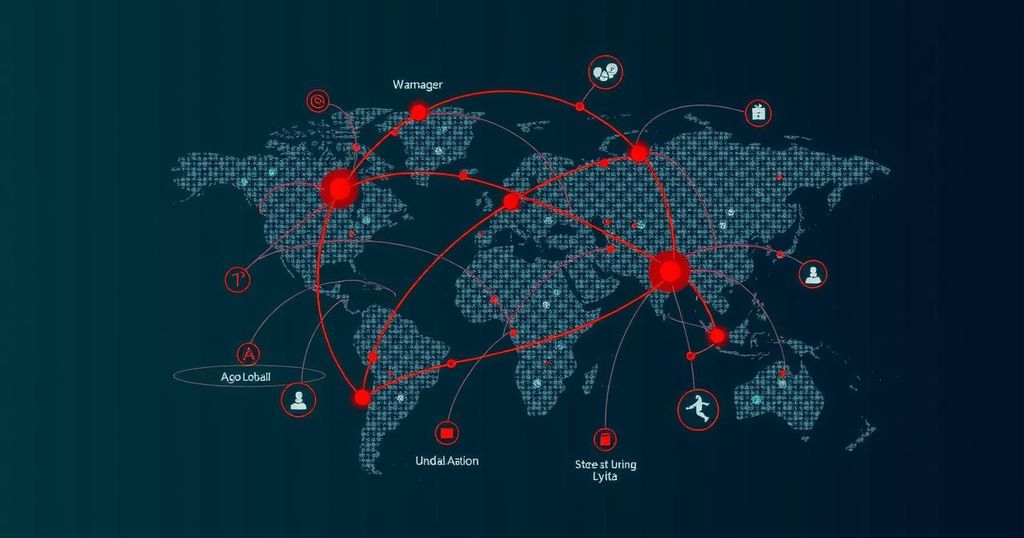Prime Minister Narendra Modi’s foreign policy emphasizes a human-centric approach, focusing on consensus, regional relations, and proactive engagement on the global stage. India has transformed into a significant player, successfully addressing various geopolitical challenges while advocating for dialogue and cooperation, particularly through its G20 presidency. Ongoing issues with neighboring countries and the shifting global landscape offer both challenges and opportunities for India’s sustained rise.
Prime Minister Narendra Modi’s foreign policy adopts a human-centric approach that emphasizes India’s evolution into a significant global player, focusing on consensus-building and strengthening regional relationships amid various challenges. Modi, providing a distinct Indian perspective shaped by principles such as dharma (duty) and vasudhaiva kutumbakam (the world as one family), has transformed India’s role on the global stage from a passive observer to a proactive influencer over the past decade. India’s economic growth, alongside its generous assistance programs, has positioned the nation as a key first responder in crises ranging from natural disasters to global pandemics. Modi’s government has demonstrated a capacity for fostering dialogue and consensus among divergent priorities, exemplified by its strategic response to conflicting international stances, such as its position on Israel’s military actions despite maintaining cordial ties with the country. Under Modi, India’s diplomatic initiatives have sought to redirect the focus towards a new human-centric approach, advocating for dialogue over conflict, particularly evident during India’s G20 presidency where the emphasis was placed on resolving disputes through conversation. This approach remains crucial concerning India’s stance on the Ukraine conflict. Despite challenges with Pakistan and China, India has wielded a strong military posture paired with diplomatic engagement, overseeing the restoration of patrolling arrangements along the contested Line of Actual Control with China. Furthermore, the Modi administration has utilized the Neighbourhood First policy to boost growth and cooperation with neighboring nations, maneuvering through geopolitical complexities to attract positive engagement. A call for reconciliation from former Pakistani Prime Minister Nawaz Sharif reflects a potential for progress, provided Pakistan moves away from its long-standing reliance on terrorism. India’s successful leadership during its G20 presidency highlighted key developmental issues, championing green transitions and digital innovation. However, challenges persist regarding participation in regional trade frameworks, particularly in light of global shifts away from reliance on the Chinese economy. The rise of propaganda within conflicts such as those in Ukraine and Gaza poses its own challenges, as they adversely affect public perception and civil society interactions within India. As India ascends to a more prominent position in global affairs, a strategic alignment with Western powers may further bolster its objectives. The implications of U.S. domestic changes, such as potential tariffs under a new administration and stabilization around conflicts, will influence India’s economic landscape and position within international relations. Overall, India’s strategic vision aims to create an inclusive and responsive international order that addresses contemporary global issues while reinforcing India’s growing stature as a responsible major power.
The article discusses India’s evolving foreign policy under Prime Minister Narendra Modi, particularly the adoption of a human-centric approach that emphasizes consensus-building and regional cooperation. It explores India’s significant shift from a passive observer to an active participant on the global stage, focusing on the underlying principles that inform its foreign relations and the strategic maneuvers that guide its interactions with other nations, especially in the context of ongoing geopolitical challenges and crises. The commentary underscores Modi’s vision of positioning India as a credible voice in international discourse while confronting issues of terrorism, cooperation with neighbors, and navigating complex relations with powers like China and Pakistan.
In conclusion, Prime Minister Narendra Modi’s foreign policy epitomizes a commitment to a human-centric approach that seeks to enhance India’s position as a leading global power. By focusing on dialogue, regional cooperation, and consensus-building, India’s strategic posture has enabled it to address contemporary challenges effectively while reinforcing its growing influence in world affairs. As India navigates complex geopolitical landscapes, its leadership and principles will play a crucial role in shaping a more inclusive and responsive international order for the future.
Original Source: www.hindustantimes.com






